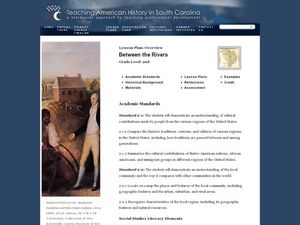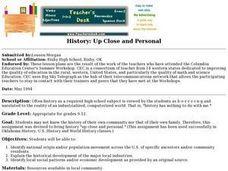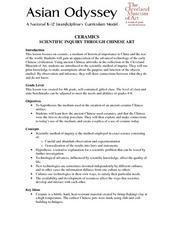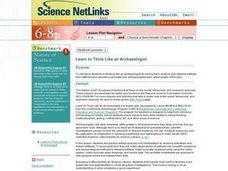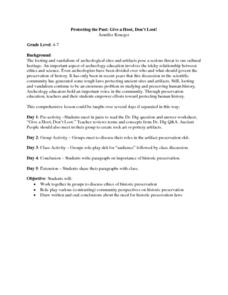Curated OER
Between the Rivers
Second graders compare and contrast historical American cultures. In this American history lesson, 2nd graders participate in reading, writing, oral, and hands on activities. Students discuss the similarities and differences...
Curated OER
History - Up Close And Personal
Students identify national origin and population movement across U.S. of ancestors and/or community residents, explain historical development of major local industries, identify local social patterns/economic development as provided by...
Curated OER
This Guilty Land
Students read and discuss several informational cards about John Brown, the historical context he lived in and his abolitionist cause. They complete a character chart and write an epitaph that conveys their opinion of his actions.
Curated OER
Ceramics Scientific Inquiry Through Chinese Art
Fourth graders explore, examine and study ceramics, a medium of historical importance to China. They review the advanced technology of the early Chinese civilization and are introduced to the scientific method of inquiry and make...
Curated OER
Ancient Man in Asia
Seventh graders analyze and synthesize information about major historical developments by interpreting data, evaluation sources of information, identifying and comparing experiences and perspectives from multiple cultural perspectives.
Curated OER
View: Visual Inquiry/Experience in Writing
Students discuss the importance of having good observational skills. Using artifacts, they discuss what can and cannot be told about previous cultures. They use their observations to write a paper about the culture and use the internet...
Curated OER
State of Mind: Inventing the American Identity
Learners define national identity, explain importance of having national identity, describe America's national identity, work together and formulate class vision of what America's national identity is, identify United States symbols and...
Curated OER
History in the Making
Students create and perform a skit that demonstrates the historical period and foriegn policy of a particular president. They first complete a diagram of George Washington's presidency as a class and then form small groups to research...
Curated OER
Child Labor in America
Students interpret historical evidence presented in primary and secondary sources. In this child labor lesson, students examine the issue of child labor and determine how citizen action prompted...
Curated OER
Issues in Public Education During the Kentucky Civil Rights Era
Students conduct oral history interviews and research historical and contemporary media articles about multiculturalism and diversity.
Curated OER
Critical Reading, Imaginative Writing and the Montage
Students discuss the difference between primary and secondary sources and consider how an exhibit is researched. They design and create a montage that reflects themselves in a social and historical context.
Curated OER
Paper Maracas
Learners create paper maracas using basic art supplies, paper plates, beans, and decorative materials in this Art and Music lesson for the 1st and 2nd grades. The lesson includes resource links, a vocabulary list, and a short historical...
Curated OER
The Uluburun Shipwreck Project: Interconnections through Trade in the Late Bronze Age Mediterranean World
Ninth graders examine causes and effects of the Uluburun shipwreck. In groups, they develop their own ways to categorize the artifacts found on the ship and decide on the research questions they are going to focus on. They use the...
Curated OER
Cultural Comparisons Interview
Students interview a family member and give an oral report. In this oral history lesson, students create interview questions relevant to an American historical period. Students interview a family member and present an oral report to the...
Eastconn
Learning to Analyze Political Cartoons with Lincoln as a Case Study
Discover the five main elements political cartoonists use—symbolism, captioning and labels, analogy, irony, and exaggeration—to convey their point of view.
Curated OER
The Treaty Trail: U.S. Indian Treaty Councils in the Northwest
Students create a timeline with the major events of the 19th and 20th century dealing with Native Americans. They examine artifacts and discuss how they reflect culture. They also identify trade routes the Native Americans used.
Curated OER
To Dig or Not to Dig: The Stadium Showdown
Students examine an ethical public dilemma. In this cultural resource lesson plan, students role play to examine their personal beliefs regarding the protection of cultural resources. They evaluate possible actions they can take to...
Curated OER
Draw Like an Egyptian
Middle schoolers discover the cultural history of Egypt by illustrating Egyptian figures. In this art history lesson, students analyze the Egyptian styles of figure drawings and emulate that by creating their own illustrations...
Curated OER
Leaarn to Think Like an Archaeologist
Students examine how to act as archaeologists by examining artifacts. The inquiry is meant to teach learners about analysis of ancient civilizations and scientific finds. Fossil evidence is also covered to make connection to the...
Curated OER
War and Remembrance
Learners explore the controversy surrounding the ban of Nazi memorabilia and other hate-related artifacts from online auction sites.
Curated OER
Asian-American History
Students access web based resources in order to study the history of Asian-Americans as they immigrated and assimilated into live in America using grade level appropriate resources. Also, they examine journals, artifacts, and complete...
Curated OER
Protecting the Past: Give a Hoot, Don't Loot
Students discuss the looting and vandalism of various archeological sites. In pairs, they read and complete a worksheet and review their answers as a class. In groups, they role play a artifact preservation skit and perform it to their...
Curated OER
How To Think Like An Archaeologist
Students take a field trip to historical Jamestown. Using artifacts given to them, they must identify them and discover who would have used them and for what purpose. They create a database to organize the information and share it with...
Curated OER
Interviewing A Parent
Students conduct an interview with a family member to research their family history. They prepare a list of questions, conduct the interview, and determine which house to visit for an artifact search.


